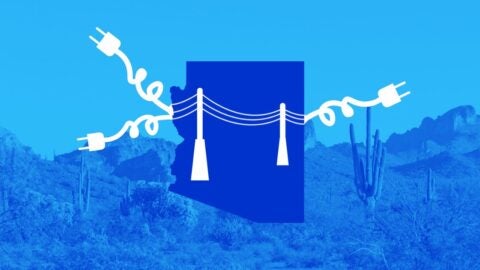How the IPCC Got Started
This post is by Michael Oppenheimer, Ph.D., the Albert G. Milbank Professor of Geosciences and International Affairs in the Woodrow Wilson School and the Department of Geosciences at Princeton University. He also serves as science advisor to Environmental Defense.
The award of the 2007 Nobel Peace Prize to Al Gore and the Intergovernmental Panel on Climate Change (IPCC) is an important milestone in the journey toward a global warming solution, and it got me thinking about how the IPCC came to be. To some extent, it was thanks to a miscalculation by the Reagan Administration!
In the mid 1980s, I was head of the atmosphere program at what was then called the Environmental Defense Fund. I was deeply concerned about the climate issue, but wasn’t sure how to stimulate government interest.
In October 1985, the UN sponsored an international meeting of scientists on climate change in Villach, Austria. Its conclusion: Increasing concentrations of greenhouse gases could cause an historic rise in global temperature. This was the first international scientific consensus on climate change and an important turning point, but the key question was, "Could this scientific concern be directed toward leveraging government action worldwide"?
To address this question, the UN’s Environment Program (UNEP), the World Meteorological Organization (WMO), and the International Committee of Scientific Unions created an international scientific panel called the Advisory Group on Greenhouse Gases (AGGG). Perhaps AGGG’s main accomplishment was to provide official auspices for a more activist group of experts that included George Woodwell, now retired as director of the Woods Hole Research Center; Bill Clark, now at Harvard’s Kennedy School; Gordon Goodman, now retired as director of the Stockholm Environmental Institute; Jill Jaeger, also then at the Institute; and me.
Our group hoped to engage governments and the public in a chain of events that would culminate in a "framework convention", a type of treaty suggested by the Villach participants. To this end, we organized or helped to plan a series of science and policy meetings between 1987 and 1990, including the highly visible World Conference on the Changing Atmosphere, sponsored by the Canadian government and held in Toronto in the summer of 1988.
Public concern in the US over climate change was rising at the time for many reasons, including the unusually hot summer in the US in 1988, a sustained drought in parts of the country, the Congressional testimony of NASA’s James Hansen pointing to a human influence on climate, and a series of unrelated but salient environmental problems, including the ozone hole. Also, other groups besides ours, in the US and abroad, were pressing for action on the climate front.
Following on the Villach meeting, Dr. Moustafa Tolba, the head of UNEP, had written to then US Secretary of State George Schultz calling for international action to address climate change. This led to considerable discussion within the US government, WMO, and UNEP. The US government decided that, as a first step, it could support an intergovernmental scientific panel to assess climate change. Facilitated by US support, the IPCC was established at the end of 1988.
IPCC’s first chairman was Swedish climatologist Bert Bolin, and its second was atmospheric scientist Bob Watson, who helped develop the assessment process for the ozone depletion problem on which the IPCC was partially modeled. In the rejoicing over the award of the Nobel Peace Prize, I hope that the contributions of Tolba, Bolin, and Watson are remembered.
US support was probably critical to IPCC’s establishment. And why did the US government support it? Assistant Undersecretary of State Bill Nitze wrote to me a few years later saying that our group’s activities played a significant role. Among other motivations, the US government saw the creation of the IPCC as a way to prevent the activism stimulated by my colleagues and me from controlling the policy agenda.
I suspect that the Reagan Administration believed that, in contrast to our group, most scientists were not activists, and would take years to reach any conclusion on the magnitude of the threat. Even if they did, they probably would fail to express it in plain English. The US government must have been quite surprised when IPCC issued its first assessment at the end of 1990, stating clearly that human activity was likely to produce an unprecedented warming.
The IPCC’s first assessment laid the groundwork for negotiation of the UN Framework Convention on Climate Change (UNFCCC), signed at the Earth Summit in 1992. In a sense, the UNFCCC and its progeny, the Kyoto Protocol, were unintended consequences of the US support for establishment of IPCC – not what the Reagan Administration had in mind!













One Comment
Exxon inspire the Bush Administration to interfere with the IPCC.
According to the documents in the following document
http://www.ucsusa.org/assets/documents/global_warming/exxon_report.pdf
On page 51 there is a facsimile from Randy Randol of ExxonMobil dated 06 Feb 2001
Page 52
‘..,The IPCC is headed by Robert Watson, an American who is also the chief science person at the World Bank (Director, Environment Dept.) Watson was hand picked by Al Gore and served in the Clinton/Gore White House Office of Science and Technology policy. His tenure at the IPCC ends with the completion of the TAR. However, he could be extended an an IPCC session this year.
During the Hague meeting in November, Watson presented a sneak preview of the Third Assessment Report with the following caveat “None of the conclusions presented in this report are taken from the TAR, but are consistent with the draft conclusions, which are subject to change until final government approval and acceptance early next year” His statement belied his real intent. Which was to get media coverage of his views before there was a chance for the process to challenge his personal agenda.”
Issue: Can Watson be replaced now at the request of the U.S.?..,’
19 April 2002 Reports that Watson had been ousted.
http://www.newscientist.com/article/dn2191-top-climate-scientist-ousted.html